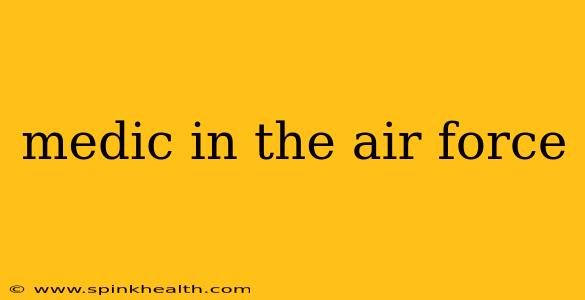The roar of the jet engines, the rush of adrenaline, the unwavering dedication to saving lives – this is the reality for Air Force medics. It's a career path far beyond the typical hospital setting, offering unique challenges and immense rewards. If you're considering a life of service combined with medical expertise, let's explore the exciting world of being a medic in the Air Force.
My journey began with a deep-seated desire to help people, coupled with an adventurous spirit. The Air Force, with its global reach and diverse medical roles, seemed like the perfect fit. This wasn't just about patching up scrapes and bruises; it was about being part of a team that provided comprehensive healthcare, from battlefield trauma to routine checkups, in the most unexpected and demanding environments.
What Does an Air Force Medic Do?
The role of an Air Force medic is incredibly varied. You won't be stuck in a single role; instead, you'll likely gain experience across several specialities. This includes:
- Providing emergency medical care: This is the heart of the job, involving everything from stabilizing patients after accidents to performing advanced life support procedures in the field.
- Managing medical facilities: Depending on your rank and experience, you might be involved in overseeing the day-to-day operations of a medical clinic or hospital, both domestically and internationally.
- Working in specialized units: From aeromedical evacuation to flight medicine, the Air Force offers a wide range of specialized roles for medical personnel. Imagine yourself providing critical care aboard a flying hospital, transporting patients across continents.
- Conducting health assessments and preventative care: This is a crucial aspect, ensuring the well-being of Airmen and their families.
- Training and mentoring: As you gain experience, you'll likely take on a mentorship role, training and guiding new recruits.
What are the Requirements to Become an Air Force Medic?
This isn't a path you can jump into lightly. The Air Force has high standards for its medical professionals. Key requirements generally include:
- A high school diploma or GED: This is the minimum educational requirement.
- A strong academic record: Excelling in science and math courses is vital.
- Passing the ASVAB: The Armed Services Vocational Aptitude Battery test assesses your aptitude for various military occupations.
- Meeting physical fitness standards: Maintaining peak physical condition is essential for this physically demanding career.
- Passing a medical examination: This ensures you meet the rigorous health standards of the Air Force.
- Completion of medical training: This will involve extensive training in various medical fields, depending on your chosen specialty.
What are the Different Air Force Medical Specialties?
The Air Force offers a variety of medical specialties, catering to diverse interests and skill sets. Some of the most common include:
- Physician Assistant: Providing comprehensive healthcare under the supervision of a physician.
- Medical Service Corps Officer: A leadership role, managing healthcare resources and personnel.
- Nurse: Providing direct patient care in a wide range of settings.
- Medical Technician: Specializing in areas like laboratory technology or radiology.
What is the Air Force Medical Career Path Like?
Progression within the Air Force medical field is structured and offers significant opportunities for advancement. You’ll have the chance to develop your skills, gain leadership experience, and potentially specialize in a specific area of medicine. The opportunities for professional growth and personal development are significant.
What is the Pay and Benefits Like for an Air Force Medic?
The Air Force offers competitive pay and a comprehensive benefits package to its medics. This includes healthcare, retirement plans, and educational opportunities. The exact compensation will depend on your rank and experience.
How Can I Become an Air Force Medic?
The first step is to visit the Air Force website and explore the medical career options available. You can find detailed information on eligibility requirements, application procedures, and available specialties. Researching specific roles and connecting with current Air Force medics is highly recommended to gain valuable insights into this exciting career path.
The life of an Air Force medic isn't for the faint of heart. It demands dedication, resilience, and a profound commitment to service. But for those who are called to this profession, the rewards are immense – a chance to make a real difference in the lives of others while experiencing a career that's both challenging and deeply fulfilling. So, if the thought of soaring to serve, combining your medical expertise with a spirit of adventure, resonates with you, then the Air Force might just be the perfect place to spread your wings.

